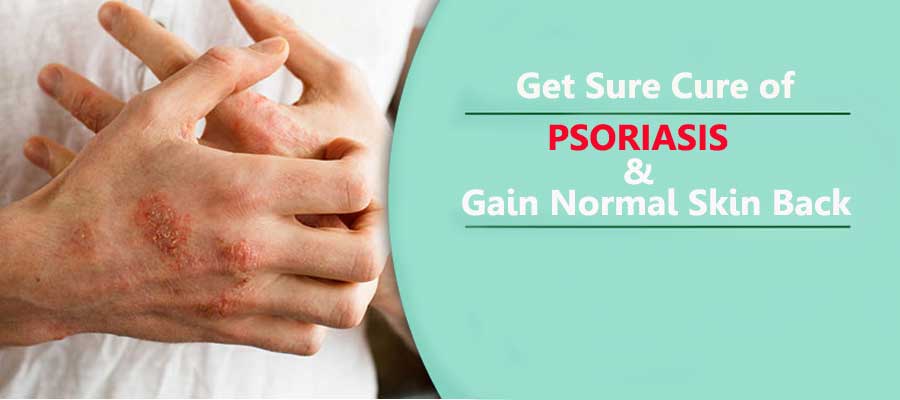
Psoriasis is an inflammatory autoimmune disorder. It is characterized by skin cells that multiply up to 10 times faster than normal. When these cells reach the surface and die, raised, red uncomfortable plaques covered with white scales form and can be cured only by Psoriasis treatment.
Psoriasis also causes systemic inflammation throughout the body, which can cause many other diseases. It may also affect other organs, including the heart, and can be linked to the development of diabetes and strokes. It is also associated with a type of inflammatory arthritis called psoriatic arthritis, which causes joint pain, swelling and damage.
Psoriasis symptoms vary depending on the type of psoriasis you have. Common psoriasis symptoms can include the following:
• Red patches of skin covered with silvery scales
• Small scaling spots
• Dry, cracked skin
• Itching, burning, or soreness
• Itchy plaques
• Small bleeding points when the scale is peeled away
•Guttate psoriasis. They are tiny little spots of psoriasis all over the back, and other parts of the body. This form of psoriasis is usually triggered by a bacterial infection, such as strep. It’s also more common in children and young adults.
•Pustular psoriasis. This type of psoriasis can be very dangerous, because it develops into pustules –pus-filled blisters – over top of red, painful patches of skin. Infections in these pustules can lead to dangerous complications.
•Erythrodermic psoriasis. This type of severe psoriasis is the least common, but can be the most debilitating. It can cover your entire body with a red, peeling rash that can itch or burn intensely, and hospitalization is usually required.
•Palmoplantar psoriasis. This form of psoriasis affects the hands and feet. It may be associated with plaque psoriasis or occur separately. It causes redness, peeling, itchiness, pain and peeling of the skin of the palms and bottoms of the feet, which can make engaging in normal daily activities such as walking very painful and nearly impossible for some patients.
• Inverse psoriasis. This form of psoriasis shows up as smooth, red patches of inflamed skin in the groin, under the breasts and in the armpits. Because it occurs in moist areas and may not look like traditional psoriasis, it is sometimes misdiagnosed as an infection.
•Scalp psoriasis. As the name suggests, scalp psoriasis occurs on the scalp. Though this form of plaque psoriasis may be confined to the scalp, it frequently extends beyond the hairline to behind the ears or to the back of the neck or forehead. Scalp psoriasis is often the first manifestation of psoriasis in children.
•Nail psoriasis. Psoriasis can affect the fingernails and toenails, causing pitting, discoloration, abnormal nail growth, separation of the nail from the nail bed and crumbling of the nails.
From an Ayurvedic perspective, Psoriasis is caused due to the vitiation of vata and kapha doshas. Accumulation of toxins or ama, could also lead to this disease condition. Strong genetic predisposition, sun deprivation, and intense infection on the upper respiratory tract can badly aggravate psoriasis. As per Ayurveda, these conditions are strong enough to create accumulation of low potency poisons.
Uneven and unhealthy food habits, consumption of foodstuffs in the wrong combination (Example: dairy products with fish), too much intake of yogurt, black gram, seafood, sour or salted food stuffs, etc. can trigger the psoriasis inducing pathogenesis. Other catalysts that cause psoriasis includes stress, alcohol, and tobacco consumption
Psoriasis can be effectively treated through Panchakarma therapies, which include Ayurvedic treatment methods for the complete detoxification of the body, and successful elimination of harmful toxins from the body fluids.
In psoriasis, purification of blood and tissues is the primary aim of Ayurvedic treatment. Toxins are cleansed from the body and the digestion is restored to prevent further accumulation by use of certain medicinal herbs and spices. Nourishing herbs are then administered to strengthen and tone the tissues to promote complete healing of the skin. Ayurveda states that diet and regimen both are equally important as in case of psoriasis chances of recurrence are very high.